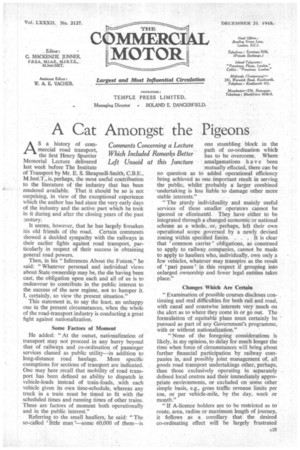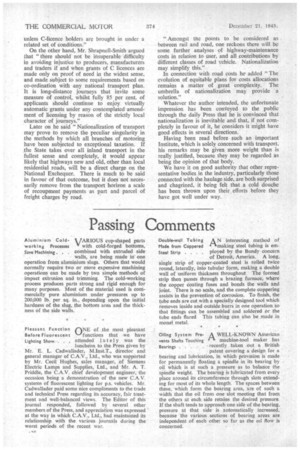A Cat Amongst the Pigeons
Page 17

Page 18

If you've noticed an error in this article please click here to report it so we can fix it.
AS a history of commercial road transport, the first Henry Spurrier Memorial Lecture delivered last week before The Institute of Transport by Mr. E. S. Shrapnell-Smith, C.B.E., is,perhaps, the most useful contribution to the literature of the industry that has been rendered available. That it should be so is not surprising, in view of the exceptional experience which the author has had since the very early days of the industry and the active part which he took in it during and after the closing years of the past :entury.
It seems, however, that he has largely forsaken his old friends of the road. Certain comments showed a decided sympathy with the railways in their earlier fights against road transport, particularly in respect of their success in obtaining general road powers.
Then, in his "Inferences About the Future," he said: "Whatever personal and individual views about State ownership may be, the die having been cast, the obligation upon each and all of us is to endeavour to contribute in the public interest to the success of the new regime, not to hamper it. I, certainly, so view the present situation."
This statement is, to say the least, an unhappy one in the present circumstances, when the whole of the road-transport industry is conducting a great fight against nationalization.
Some Factors of Moment He added: "At the outset, nationalization of transport may not proceed in any hurry beyond that of railways and co-ordination of passenger services classed as public utility—in addition to long-distance road haulage. More specific exemptions for sections of transport are indicated. One may here recall that mobility of road transport has been defined as ability to dispatch in vehicle-loads instead of train-loads, with each vehicle given its own time-schedule, whereas any truck in a train must be timed to fit with the scheduled times and running times of other trains. These are factors of moment both operationally and in the public interest."
Referring to the small hauliers, he said: "The so-called 'little man '—some 60,000 of them—is one stumbling block in the path of co-ordination whicb has to be overcome. Where amalgamations have been mutually effected, there can be no question as to added operational efficiency being achieved as one important result in serving the public, whilst probably a larger combined 'undertaking is less liable to damage other more stable interests."
"The sturdy individuality and mainly useful services of these smaller operators cannot be ignored or eliminated. They have either to be integrated through a changed economic or national scheme as a whole,. or, perhaps, left their own operational scope governed by a newly devised zoning within specified limits. . . It is clear that 'common carrier' obligations, as construed to apply to railway companies, cannot be made to apply to hauliers who, individually, own only a few vehicles, whatever may transpire as the result of 'pan passu ' in this respect if grouping into enlarged ownership and fewer legal entities takes place."
Changes Which Are Certain "Examination of possible courses discloses continuing and real difficulties for both rail and road, with canal and coastwise interests very much on the alert as to where they come in or go out. The formulation of equitable plans must certainly be pursued as part of any Government's programme, with or without nationalization."
"None of the foregoing considerations is likely, in my opinion, to delay for much longer the time when force of circumstances will bring about further financial participation by railway companies in, and possibly joint management of, all goods road transport undertakings other, perhaps, than those exclusively operating in separately defined local centres and their immediately appropriate environments, or excluded on some other simple basis, e.g., gross traffic revenue limits per ton, or per vehicle-mile, by the day. week or month."
"If A-licence holders are to be restricted as to route, area, radius or maximum length of journey, it follows as a corollary that the desired co-ordinating effect will be largely frustrated unless C-licence holders are brought in under a related set of conditions," On the other hand, Mr. Shrapnell-Srnith argued that "there should not be insuperable difficulty in avoiding injustice to producers, manufacturers and traders if and when grants of C licences are made only on proof of need in the widest sense, and made subject to some requirements based on co-ordination with any national transport plan. It is long-distance journeys that invite some measure of control, whilst fully 85 per cent. of applicants should continue to enjoy virtually automatic grants under any contemplated amendment of licensing by reason of the strictly local character of journeys."
Later on he said "Nationalization of transport may prove to remove the peculiar singularity in the methods by which all branches of motoring have been subjected to exceptional taxation. If the State takes over all inland transport in the fullest sense and completely, it would appear likely that highways new and old, other than local residential roads, will be a direct charge on the National Exchequer. There is much to be said in favour of that outcome, but it does not necessarily remove from the transport horizon a scale of recoupment payments as part and parcel of freight charges by road. "Amongst the points to be considered as between rail and road, one reckons there will• be some further analyses of highway-maintenance costs in relation to user, and all contributions by different classes of road vehicle. Nationalization may simplify this."
In connection with road costs he added "The evolution of equitable plans for costs allocations remains a matter of great complexity. The umbrella of nationalization may provide a solution."
Whatever the author intended, the unfortunate impression has been conveyed to the public through the daily Press that he is convinced that nationalization is inevitable and that, if not completely in favour of it, he considers it might have good effects in several directions.
Having been read before such an important Institute, which is solely concerned with transport, his remarks may be given more weight than is really justified, because they may be regarded as being the opinion of that body.
We have it on good authority that other representative bodies in the industry, particularly those connected with the haulage side, are both surprised and chagrined, it being felt that a cold douche has been thrown upon their.efforts before they have got well under way.




























































